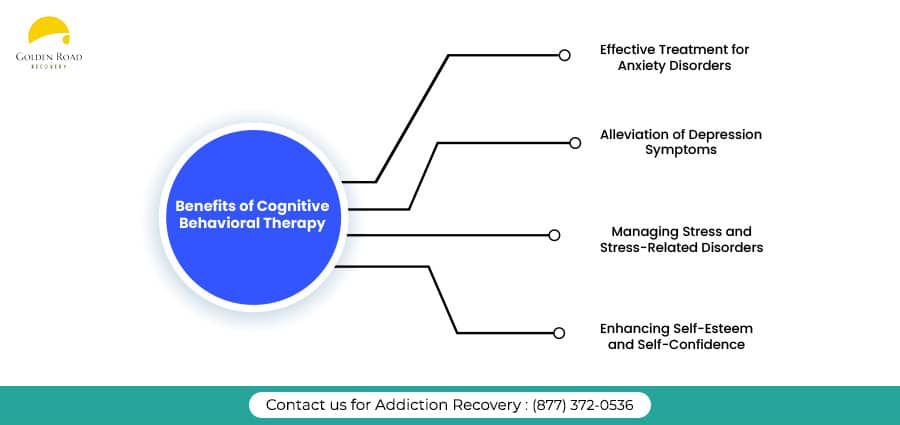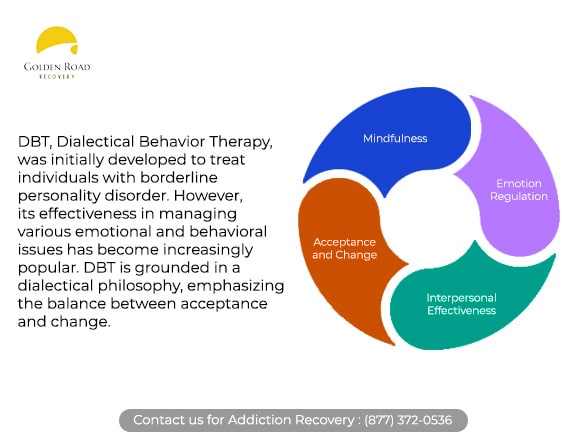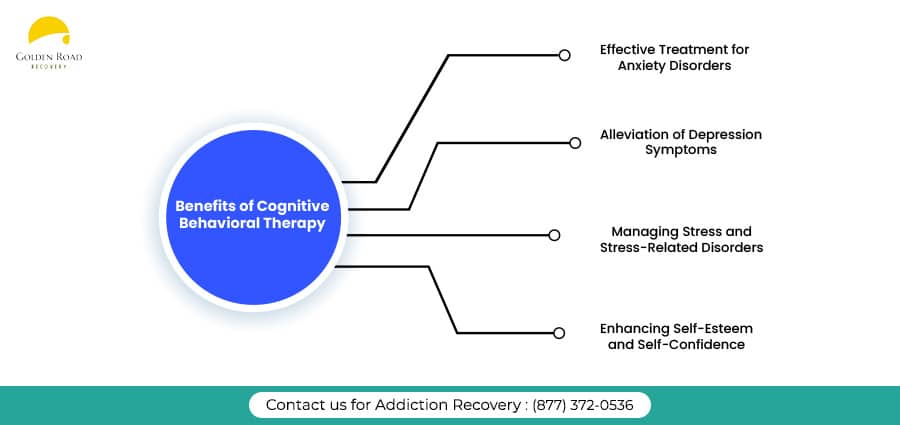When it comes to mental health and therapy, different methods are used to meet the specific needs of people with emotional and psychological problems.
Cognitive-behavioral therapy (CBT) and Dialectical Behavior Therapy (DBT) are two well-known types of therapy that are often used. These therapeutic approaches are beneficial for people with trouble with their mental and emotional health.
This article will detail the differences between CBT and DBT, showing how they help with the healing process.
What is Cognitive-behavioral therapy (CBT)?
Cognitive Behavioral Therapy (CBT), often regarded as the “gold standard” in psychotherapy, is a structured, goal-oriented approach focusing on the connection between thoughts, emotions, and behaviors. Developed by Aaron T. Beck in the 1960s, CBT has proven highly effective in treating various conditions, including anxiety, depression, and phobias.
CBT operates on the fundamental premise that our thoughts significantly influence our emotions and, consequently, our behaviors. The therapist and the individual work collaboratively to identify negative thought patterns and replace them with more constructive, rational thinking. This process helps individuals control their emotional responses and behavioral reactions better.
What are the Core Principles of Cognitive Behavioral Therapy (CBT)?
- Thought Restructuring: Central to CBT is identifying and restructuring negative thought patterns. It involves recognizing cognitive distortions and working to replace them with more balanced, realistic thoughts.
- Behavioral Interventions: In CBT, the focus extends to identifying and altering problematic behaviors. Individuals learn to cope with emotional distress through healthier behavioral choices.
- Collaborative Approach: CBT sessions involve active therapist and client collaboration. Together, they set goals and work toward behavioral changes.
- Time-Limited: CBT is typically a shorter-term therapy, often 12 to 16 weeks. It’s structured and goal-oriented, making it a practical choice for addressing specific issues.
What are the benefits of Cognitive Behavioral Therapy (CBT)?

Effective Treatment for Anxiety Disorders:
CBT has consistently proven effective in treating various anxiety disorders, such as generalized anxiety disorder, social anxiety disorder, and panic disorder. The structured nature of CBT helps individuals identify and challenge their anxious thought patterns, resulting in reduced anxiety levels and improved overall mental health.
Alleviation of Depression Symptoms:
Depression is a prevalent mental health concern, and CBT has been instrumental in alleviating its symptoms. Through targeted interventions, individuals learn to recognize and modify negative thought processes associated with depression. Over time, this leads to improved mood, increased motivation, and an enhanced quality of life.
Managing Stress and Stress-Related Disorders:
Stress is an inevitable part of life, but excessive stress can lead to various health problems. Cognitive Behavioral Therapy equips individuals with effective stress management techniques. By identifying stressors and learning how to cope with them, CBT helps reduce stress’s impact on mental and physical well-being.
Enhancing Self-Esteem and Self-Confidence:
Low self-esteem and self-confidence issues can profoundly impact one’s life. CBT can address these issues by helping individuals challenge negative self-perceptions and develop a more positive self-image. It, in turn, fosters healthier relationships and improves overall well-being.
What is Dialectical Behavior Therapy (DBT)?

DBT, Dialectical Behavior Therapy, was initially developed to treat individuals with borderline personality disorder. However, its effectiveness in managing various emotional and behavioral issues has become increasingly popular. DBT is grounded in a dialectical philosophy, emphasizing the balance between acceptance and change.
DBT is particularly well-suited for individuals with more complex emotional struggles, including those with borderline personality disorder, suicidal tendencies, or self-harm behaviors. It’s often a long-term therapy, providing comprehensive support to individuals who require ongoing assistance managing their emotions.
What are the Core Principles of Dialectical Behavior Therapy (DBT)?
- Mindfulness: DBT strongly emphasizes mindfulness, encouraging individuals to be fully present in the moment. Mindfulness practices help in emotional regulation and distress tolerance.
- Emotion Regulation: DBT equips individuals with tools to understand and manage their intense emotions, promoting healthier responses.
- Interpersonal Effectiveness: This facet of DBT focuses on improving communication and relationships, helping individuals navigate their social interactions more effectively.
- Acceptance and Change: DBT promotes a balance between accepting one’s current state and striving for positive change. This dialectical approach underlines the therapy’s effectiveness.
What are the benefits of Dialectical Behavior Therapy (DBT)?

Improved Emotional Regulation:
One of the best things about DBT is that it makes it easier to control your emotions. Individuals who undergo DBT have fewer mood swings and are better able to handle stress. It can make a massive difference in the lives of people with BPD, bipolar disorder, or severe anger and anxiety.
Enhanced Interpersonal Relationships:
DBT’s focus on interpersonal effectiveness leads to more harmonious relationships. Individuals can build healthier connections with family, friends, and colleagues by learning communication skills and conflict-resolution strategies.
Reduced Self-Harming Behaviors:
Many people with BPD hurt themselves to deal with their intense emotional pain. DBT offers different ways to deal with problems that can significantly reduce harmful behaviors that hurt oneself.
Alleviation of Suicidal Thoughts:
Individuals grappling with suicidal thoughts often find solace and hope through DBT. The therapy equips them with essential skills to navigate these dark moments and emerge with a renewed sense of purpose.
Effective Stress Management:
Life’s challenges can be overwhelming, but DBT imparts distress tolerance skills, enabling individuals to handle stressors healthily. It mainly benefits individuals with post-traumatic stress disorder (PTSD) and other anxiety-related conditions.
What are the differences between CBT and DBT (CBT vs DBT)?
Now, let’s delve into the key distinctions between these two therapeutic approaches:
Philosophical Approach:
-
- CBT: It is based on the philosophy that thoughts, emotions, and behaviors are interconnected. It identifies and challenges negative thought patterns to promote healthier emotions and behaviors.
- DBT: It adopts a dialectical philosophy, emphasizing a balance between acceptance and change. It encourages individuals to accept their current state while striving for positive transformations.
Duration:
-
- CBT: CBT is typically a shorter-term therapy, often completed in 12 to 16 weeks. It is structured and goal-oriented, making it practical for addressing specific issues.
- DBT: DBT is a longer-term therapy that provides sustained support over an extended period. It’s well-suited for individuals with more complex emotional struggles and may continue for a year or more.
Applicability:
-
- CBT: CBT is versatile and can be applied to various mental health issues, including anxiety, depression, and phobias.
- DBT: While effective for many mental health challenges, DBT is often the therapy of choice for individuals with more complex issues, such as borderline personality disorder, suicidal tendencies, or self-harm behaviors.
Emphasis:
-
- CBT: The primary emphasis in CBT is on identifying and restructuring negative thought patterns and behaviors. Individuals learn to challenge cognitive distortions and make healthier choices in response to emotions.
- DBT: DBT places a strong emphasis on four core areas—mindfulness, emotion regulation, interpersonal effectiveness, and acceptance and change. It equips individuals with tools to manage intense emotions, improve communication and relationships, and develop distress tolerance.
Collaboration:
-
- CBT: In CBT, there is active collaboration between the therapist and the client. Together, they set specific goals and work toward behavioral changes.
- DBT: DBT also involves collaboration between the therapist and the client. However, it emphasizes the therapeutic relationship, which is central to the therapy’s effectiveness.
Conclusion
If you or a loved one is seeking a rehab aftercare program in California, you’ve likely encountered many options. Among these, Golden Road Recovery stands out as a beacon of hope for those on the journey to recovery. Our evidence-based approach, incorporating CBT and DBT therapy, empowers individuals to overcome addiction and build a brighter, more fulfilling future.
Our comprehensive approach to addiction treatment in Los Angeles combines the power of Cognitive Behavioral Therapy (CBT) and Dialectical Behavior Therapy (DBT) to provide you with the most effective and supportive recovery experience.
Call us at (877-372-0536); we are here to guide you every step. With a personalized approach to care, we are committed to your lasting recovery and well-being.
FAQs on CBT vs DBT
Q: Is CBT or DBT more effective for anxiety disorders?
A: CBT and DBT are effective for anxiety disorders, but the choice between them depends on individual preferences and the specific nature of the anxiety.
Q: Can CBT and DBT be used together?
A: In some cases, CBT and DBT techniques may be used to address complex mental health challenges effectively.
Q: Are there any age restrictions for CBT and DBT?
A: CBT and DBT can be adapted for individuals of various age groups, making them suitable for adolescents and adults.





